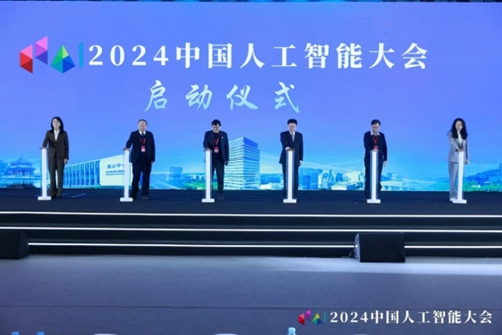Beijing leads AI advancements at CCAI2024 that brought together experts and scholars from both academia and industry.
China’s top academics, officials, and enterprises gathered on Saturday at the 10th Chinese Congress on Artificial Intelligence (CCAI2024) in Beijing to share the latest advancements and applications of AI in the global landscape.
The event, organized by the Chinese Association for Artificial Intelligence (CAAI) with support from the Beijing Municipal Science & Technology Commission and the Zhongguancun Science Park Administrative Committee, brought together over ten prominent scholars and more than 100 experts from both academia and industry.
A major highlight of the opening was the release of the Beijing Artificial Intelligence Industry White Paper (2024). This report, developed by the Beijing Municipal Science & Technology Commission and the Zhongguancun Science Park Administrative Committee, forecasts that Beijing’s AI industry will exceed 3,000 billion yuan ($412.3 billion) by the end of 2024, achieving this goal a year earlier than expected. The city’s AI ecosystem is supported by 36 unicorn companies and a thriving financing market, with AI-related social financing reaching approximately 320 billion yuan in the first three quarters of 2024.
The white paper emphasizes Beijing’s leadership in AI innovation, supported by top academic institutions, research platforms, and leading enterprises. The capital is home to 30 universities offering AI programs and numerous national research labs that have contributed to breakthroughs in areas like large-scale model training and multi-modal systems. AI-driven solutions are also being applied in fields such as education, healthcare, and public services, reinforcing Beijing’s status as a global AI hub.
Additionally, the conference introduced the “Super-Node Computing Cluster Innovation Consortium,” bringing together major tech companies like Inspur and Alibaba Cloud, research institutions, and government bodies to develop advanced AI infrastructure. This initiative aims to address computational limitations by advancing interconnected systems for trillion-parameter models. Keynote sessions explored topics such as large AI models, emergent intelligence, and intelligent decision-making. A special panel, “AI for Math & Math for AI,” highlighted the integration of Chinese mathematical traditions with AI innovation to address practical challenges and drive future advancements.
Related Posts
China Proposes Group to Promote Cooperation on Artificial Intelligence

















